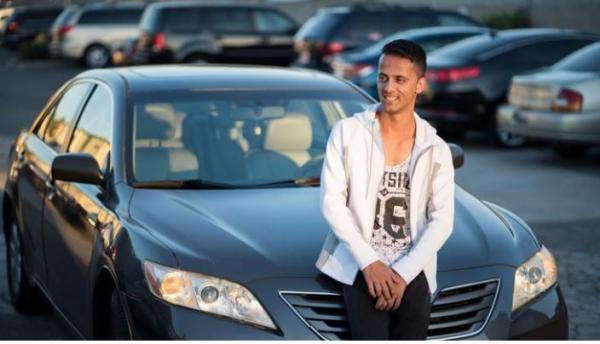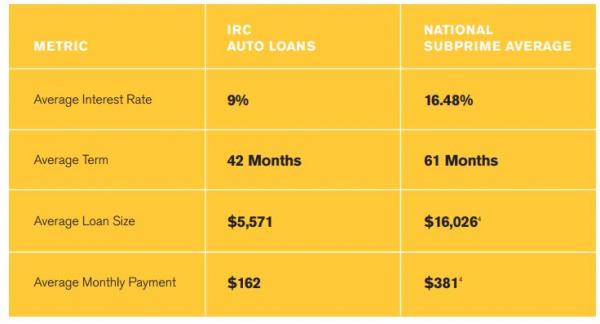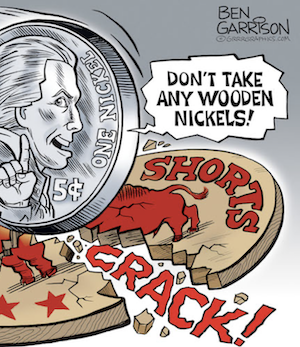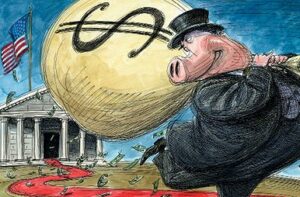
From Camel to Camry – on the American dime…
If ever there was a doubt that auto sales have been pushed to the absolute max in this iteration of the industry’s debt-fueled bubble, then consider the following program specifically designed to underwrite subprime auto loans to refugees who have recently arrived in the U.S. with absolutely no credit history or record of any kind. Per The San Diego Union-Tribune:
Newly arrived refugees, especially in driving-oriented places like San Diego, can have trouble finding jobs if they don’t have cars. Because new arrivals generally have no credit history in the U.S. and sometimes make mistakes early on because they don’t understand the system, they often can’t get affordable loans to purchase a car.
“The struggle of a low-income immigrant family that’s looking to move up, it’s hard enough as it is,” said Kasra Movahedi, director of the Center for Economic Opportunity. “If you also then have low credit, it just becomes that much harder in a hundred small and not-so-noticeable ways. Unfortunately, these are the people that can afford it the least.”
That struggle is similar to other low-income families coping with low credit scores, Movahedi said.
“It has to start with one recognizing the importance of a vehicle to a family’s financial stability and solvency,” Movahedi said. “The vehicle allows you to earn an income. In the absence of that, people are going to have a really hard time making money.”
Four offices of the IRC currently offer the program — San Diego, Oakland, Phoenix and Salt Lake City. The organization is planning on adding it to its Atlanta office soon, Movahedi said.
Even better, these refugee auto loans are underwritten at interest rates that are roughly half the national subprime average.
Beyond providing a much lower interest rate than the national average for subprime lenders, the IRC’s program requires borrowers to go through financial education courses and to sit down with a financial counselor to make a budget. It also requires earned income verification.
In San Diego, many refugees have gotten loans through the program by submitting letters from an employer that will hire them as long as they have a way to get to work, Movahedi said. Through the car loan program, the refugee is able to accept the job offer and then has income to pay off the loan.
“We view auto loans as something that can enhance and expand the geographic scope of your job search,” Movahedi said.
Farhad Yaqoobi, 24, is a refugee from Afghanistan who came to El Cajon about 11 months ago and used the program to buy a used Toyota Camry.
“It saved me time and solved lots of my problems,” Yaqoobi said.
 All that said, IRC notes that their subprime auto loan portfolio performs substantially better than those created by the likes of “Santander”…a fact that they contribute to actually taking the time to verify income.
All that said, IRC notes that their subprime auto loan portfolio performs substantially better than those created by the likes of “Santander”…a fact that they contribute to actually taking the time to verify income.
By virtually every metric, these low-income refugee borrowers and the IRC’s auto loan portfolio have significantly outperformed the national subprime industry. Consider, for example, that while the national subprime auto loan 60-day delinquency rate is 5.07%, the IRC’s portfolio has 0% 60-day delinquency. Similarly, the IRC and CEO’s auto loan portfolios have a combined historical default rate of 1.95%, which is well below the national average of 11.96%5 for subprime auto loans.
Underwriting due-diligence matters. Recent reports have revealed that one of the nation’s largest subprime auto lenders, Santander, verified income on only 8% of all of its subprime auto loans. By contrast, the IRC requires not only income verification, but a meeting with a financial coach, financial education training, and a completed family budget as part of our loan making. This personalized review of the potential borrower’s situation – even for modest loan sizes – leads to careful decisions about readiness to take out the loan. The IRC helps borrowers plan for the loan and aims to set them up for success. By contrast, many subprime auto loans are being made with shockingly little due diligence. Given the unabated growth in size and number of actors in the subprime auto loan market, one can readily question whether the real business model is predicated on loan repayment margins, or if it is actually organized around borrowers defaulting and vehicles being repossessed and resold over and over again. Low-income families need greater protection from loans that undermine rather than bolster their financial footing.
Of course, we suppose there’s no better way to assimilate a new generation of Americans than to throw some subprime debt at them so they can purchase a bunch of stuff they can’t really afford just yet…it’s the American way.
Written by Tyler Durden and published by Zero Hedge ~ October 26, 2017.
 FAIR USE NOTICE: This site contains copyrighted material the use of which has not always been specifically authorized by the copyright owner. We are making such material available in our efforts to advance understanding of environmental, political, human rights, economic, democracy, scientific, and social justice issues, etc. We believe this constitutes a ‘fair use’ of any such copyrighted material as provided for in section 107 of the US Copyright Law. In accordance with Title 17 U. S. C. Section 107, the material on this site is distributed without profit to those who have expressed a prior interest in receiving the included information for research and educational purposes. For more information go to: http://www.law.cornell.edu/uscode/17/107.shtml
FAIR USE NOTICE: This site contains copyrighted material the use of which has not always been specifically authorized by the copyright owner. We are making such material available in our efforts to advance understanding of environmental, political, human rights, economic, democracy, scientific, and social justice issues, etc. We believe this constitutes a ‘fair use’ of any such copyrighted material as provided for in section 107 of the US Copyright Law. In accordance with Title 17 U. S. C. Section 107, the material on this site is distributed without profit to those who have expressed a prior interest in receiving the included information for research and educational purposes. For more information go to: http://www.law.cornell.edu/uscode/17/107.shtml








